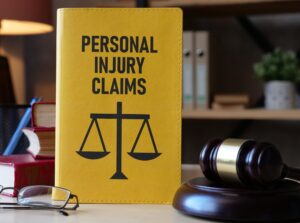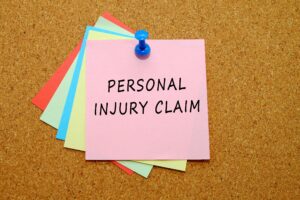Can You Sue On Behalf Of Someone Else? – A Complete Guide For Claiming Compensation For Someone Else
By Danielle Fletcher. Last Updated 17th January 2024. If someone is injured in an accident that wasn’t their fault, they could be entitled to compensation. Sometimes, though, a person injured by the negligence of others is incapable of starting their own claim. You may want to sue on behalf of someone else in this instance.
The reasons can vary. It may be because they’re under the age of 18, for example. Or they could lack the mental capacity to start a claim on their own behalf. Alternatively, they may have passed away before being able to claim for themself.
If someone close to you, like a family member, has been injured in an accident that wasn’t their fault, you may be asking if you can start a personal injury compensation claim on their behalf. If the injured person cannot claim on their own behalf, you could potentially start the claim for them as a representative.
In this guide, we explain the circumstances and procedures that allow you to claim compensation on behalf of someone else. We also explain how you can get expert advice on making a personal injury claim for someone else.

Can you sue on behalf of someone else?
Get In Touch With Our Team
Here at UK Law, our panel of lawyers can provide you with expert knowledge on personal injury claims. Our advisors can answer any questions you may have whether you are seeking compensation for yourself or to sue on behalf of someone else.
You’re welcome to contact us online through our online chat function or by completing our online claim form. You can also reach us on the phone by calling 020 3870 4868
Services And Information
- What Is A Personal Injury Claim?
- What Is A Litigation Friend?
- Bringing A Claim On Behalf Of A Vulnerable Person
- Bringing A Claim On Behalf Of A Deceased Person
- Bringing A Claim On Behalf Of A Child
- Compensation In Personal Injury Claims
- Time Limits When Claiming On Behalf Of Other People
- Do You Handle Personal Injury Claims On A No Win No Fee Basis?
- Other Information
What Is A Personal Injury Claim?
A personal injury claim made on behalf of someone else can be similar to one made on your own behalf. In order to start this sort of claim and have it be successful, you need to establish what caused the injuries to the person you’re representing. When making an injury claim against an individual or company, you need to establish the following:
- The injured individual was owed a duty of care by the person/company you’re claiming against.
- The duty of care was in some way breached.
- It was this breach of duty that caused the injuries sustained.
These points need to be established with evidence to realistically succeed with a claim. That applies whether the claim is being made on your own or someone else’s behalf.
If someone wants to start a personal injury claim, they are in many circumstances expected to start it on their own behalf. In such cases, an individual could get in touch with a qualified solicitor who they could hire to work on their case.
If an injured person is below the age of 18, they are not eligible to make a claim on their own behalf. The same applies if an individual lacks the mental capacity to make a claim on their own. If someone dies because of negligence, then compensation can still be paid out even if the victim obviously cannot claim on their own behalf.
Such potential scenarios are why the law allows for a representative to claim on someone else’s behalf in some cases. A representative who can sue on behalf of someone else is called a litigation friend.
Before claiming for someone else, you could act as a litigation friend or have power of attorney. For example, a parent or a guardian, as it can be easier to assure the court the victim’s interests are protected.
What Is A Litigation Friend?
You may be asking what a litigation friend actually is. In short, it is a person who starts a compensation claim and makes decisions about it on behalf of and in the best interests of:
- A child under 18
- An adult who lacks the mental capacity to claim with or without a lawyer
If a claim goes to court, then the litigation friend may have to attend hearings. However, a litigation friend can use the services of a solicitor and they can go to court in their place. A solicitor can also act as a litigation friend.
An adult with a litigation friend is referred to as the ‘protected party’ in court. There are certain procedures to follow in order to serve as a litigation friend.
You can become a litigation friend by being appointed by a court to represent a protected party. This can happen either through a court order or by applying to become someone’s litigation friend.
Who Is Eligible To Be A Litigation Friend?
Before you can become a litigation friend, a court will check your suitability. They do this by making sure that you do not have any conflict of interests that could work against the injured person.
A litigation friend can be someone close to the injured person. Parents, guardians, other family members, trusted friends or a social worker may be chosen to be litigation friends.
Other examples of litigation friends are:
- Solicitors
- Professional advocates, such as an Independent Mental Capacity Advocate (IMCA)
- Court of Protection deputies
What Are The Duties Of A Litigation Friend?
If you’re appointed as a litigation friend, you have several important responsibilities. You’re expected to make decisions in the best interest of the injured party. You also need to communicate and cooperate with the solicitor working on the injured party’s claim (if applicable). You also need to make sure you tell the person you’re claiming on behalf of what’s happening in the case.
Vulnerable People – Can You Sue Someone On Their Behalf?
A vulnerable person is officially defined as a person in need of special care or support. This can be because of their age, their mental capacity or because they suffer from a disability.
If you were the appointed guardian, or a close friend or family member, of a vulnerable adult injured by negligence, then you could potentially sue someone on their behalf.
You could act as a litigation friend. As mentioned, being a litigation friend does not mean you will have to act as their solicitor in court. You would still be able to appoint a solicitor, but you would be in charge of instructing them on behalf of the claimant.
If you are looking for more information about how to represent a vulnerable person in a claim, please reach out to one of our advisers for information about suing someone as a litigation friend.
Bringing A Claim On Behalf Of A Deceased Person
If someone close to you is killed in an accident, then it’s possible you could bring a compensation claim forward on their behalf. A claim on behalf of a deceased person can provide compensation to their estate to cover loss of life and income. You could contact a solicitor to discuss the potential claim if you wish to make one on behalf of a deceased friend or family member.
It can understandably be difficult for some people to discuss a fatal accident involving someone close to them. You may need to be prepared to discuss the circumstances of how the deceased person passed. If you use the services of a solicitor, you should be able to handle this process in the way that’s most comfortable for you, whether it’s in person, over the phone or in writing.
The amount of compensation paid out for a death caused by negligence can vary a lot. If the deceased person had family members who were financially dependant on them, then this could be factored into their final compensation.
You can contact UK Law for free specialist advice if you have any questions about making a claim on behalf of a deceased person.
Making A Personal Injury Claim – Child Personal Injury Claims
If a child is injured in an accident that was caused by a negligent third party, they may be able to receive personal injury compensation.
In order for child personal injury claims to be successful, it’s important that there is evidence to indicate another party’s negligence led to the child being injured. You must also have evidence of how the accident occurred. This could be in the form of medical reports and photos of the accident site or injury.
When making a personal injury claim on behalf of a child, someone must be appointed as a litigation friend. Any suitable adult could be a litigation friend if they can be trusted to make decisions within the child’s best interests. A litigation friend can act at any time from the date of the accident until the claimant’s 18th birthday.
If a claim is not started on behalf of a child, they can begin a claim within 3 years from their 18th birthday. The limitation period is set out in the Limitation Act 1980.
You may be wondering, ‘what happens to children’s compensation in personal injury claims?’. Before they turn 18, the compensation is held in a Court Funds Office account and cannot be accessed unless there is exceptional circumstances, such as the need for emergency surgery. Once the claimant turns 18, they can withdraw the money.
Please don’t hesitate to contact our team if you have any other questions.
Compensation In Personal Injury Claims
Now that you know who you can sue on behalf of, we’ll look at compensation.
If you’re claiming compensation on behalf of another person, you may wonder how much compensation they could receive. It depends on several factors. The type and severity of injuries involved are major factors. Whether the injured party is found to be partially responsible for the injuries also affects the compensation given out.
It can therefore be tricky to calculate compensation before a case concludes. However, we can provide some estimates of injury values using Judicial College guidelines. It is a regularly updated publication that solicitors may use to value injuries.
In the table below, we’ve included estimates for potential compensation payouts. Excluding the top row, these figures are from the 16th edition of the JCG. The top row is included to show you how compensation could be awarded when claiming for multiple severe injuries and special damages. The figures relate to certain injuries which you may be claiming compensation for on someone else’s behalf.
| Injury Type | Severity | Notes | Potential Compensation |
|---|---|---|---|
| Multiple Very Severe Injuries and Expenses | Very Serious | Compensation could be claimed for more than one very severe injury and related expenses, such as full time nursing care. | Up to £1,000,000+ |
| Brain Damage | Very Severe | Symptoms require full time nursing care and including lack of response to environment and double incontinence. | £282,010 to £403,990 |
| Leg Injuries – Amputations | Loss of Both Legs | Either both legs are amputated above the knee or one at a high level and the other below the knee. | £240,790 to £282,010 |
| Back Injuries | Severe (i) | Nerve root and spinal cord damage causes very serious consequences, pain and disabilities. | £91,090 to £160,980 |
| Neck Injuries | Severe (ii) | Serious fractures or serious damage to cervical spine result in considerably severe disabilities. | £65,740 to £130,930 |
| Knee Injuries | Severe (i) | Loss of function, considerable pain and lengthy treatment occur as the result of a serious knee injury. | £69,730 to £96,210 |
| Hand Injuries | Amputation of Index, Middle and/or Ring Fingers | The claimant’s hand is of very little use as a result of these amputations. | £61,910 to £90,750 |
| Foot Injuries | Severe | Injuries found in this bracket include fractures of both heels or an unusually severe injury to one foot. | £41,970 to £70,030 |
| Arm Injuries | Substantial and Permanent Disablement | Fractures to one or both forearms have caused a permanent residual disability of a significant nature. | £39,170 to £59,860 |
| Wrist | Signficant | Although some useful movement remains, the injury has caused a permanent and significant disability. | £24,500 to £39,170 |
The injuries and payouts listed above are just some examples that will likely fall under general damages. For a compensation claim you may be involved in, the injured party may receive compensation for special damages.
This can cover financial losses caused directly by the injury or illness on which the claim is focused. For example, a loss of earnings.
If you are looking to make an injury claim for another person, you can contact UK Law for a compensation estimate which is more specific to your case.
Time Limits When Claiming On Behalf Of Other People
As previously stated, when you sue a person, there’s a typical time limit of three years to start your claim. However, when suing someone on behalf of another person, this time limit might be suspended.
When claiming on behalf of a child, the time limit does not start until their 18th birthday. A litigation friend could sue someone on their behalf at any point before they turn 18.
In the case of someone lacking the mental capacity to claim, the time limit is suspended indefinitely. Similarly, a litigation friend can make a claim on their behalf. If the claimant recovers, they will have 3 years to start a claim on their own behalf.
Our advisors can help you start a claim on behalf of another person and explain how to become a litigation friend. Call them today for free personal injury claiming advice.
Do You Handle Personal Injury Claims On A No Win No Fee Basis?
If you are claiming on behalf of a party who can’t initiate their own case, you may wish to have the services of a personal injury solicitor during the legal process. If so, one of the personal injury solicitors from our panel could help you, provided the case is valid. Our panel typically offer their legal services under a Conditional Fee Agreement (CFA). This is a type of No Win No Fee agreement.
When your solicitor works with you on a No Win No Fee basis, they don’t take payments upfront. They also won’t ask for any payments for their services as your claim is ongoing. Furthermore, if the personal injury claim made on behalf of someone else is not successful, they won’t ask for a payment to cover their work on the case.
However, if the claim is successful, your solicitor will take a success fee from the awarded compensation. This amount is a small percentage which is capped by the law.
Contact Us For More Help
If you have any questions regarding can you sue on behalf of someone else, get in touch with one of our team members. One of our advisors can provide a free initial consultation and discuss the claims process with you. Additionally, if you satisfy the eligibility criteria, you could be connected to one of the solicitors from our panel. You can reach our team by:
- Using our online chat function on our website
- Completing our claim online form
- Calling us on 020 3870 4868
Other Information
The resources below could prove useful if you are looking to sue on behalf of someone else. You can contact UK Law if you have any sort of question about claiming for another person.
- Apply To Be A Litigation Friend – This government page advises on what you need to know about applying to become a litigation friend and the eligibility criteria.
- Requesting CCTV Footage – CCTV footage of the accident is a good form of evidence to have read this government guide on the subject.
- Medical Negligence Claims – If you or a loved one suffered due to medical negligence, our guide could give some insight into what steps you could take next.
- Car Accident Claims – If the person you wish to make a claim for suffered in a car accident, you may consider looking into our guide.
- Food Allergy Claims – We also have a guide on your rights if you or your loved one suffered an allergic reaction due to negligence.
More Useful Compensation Guides
Writer PD
Checked by HT







